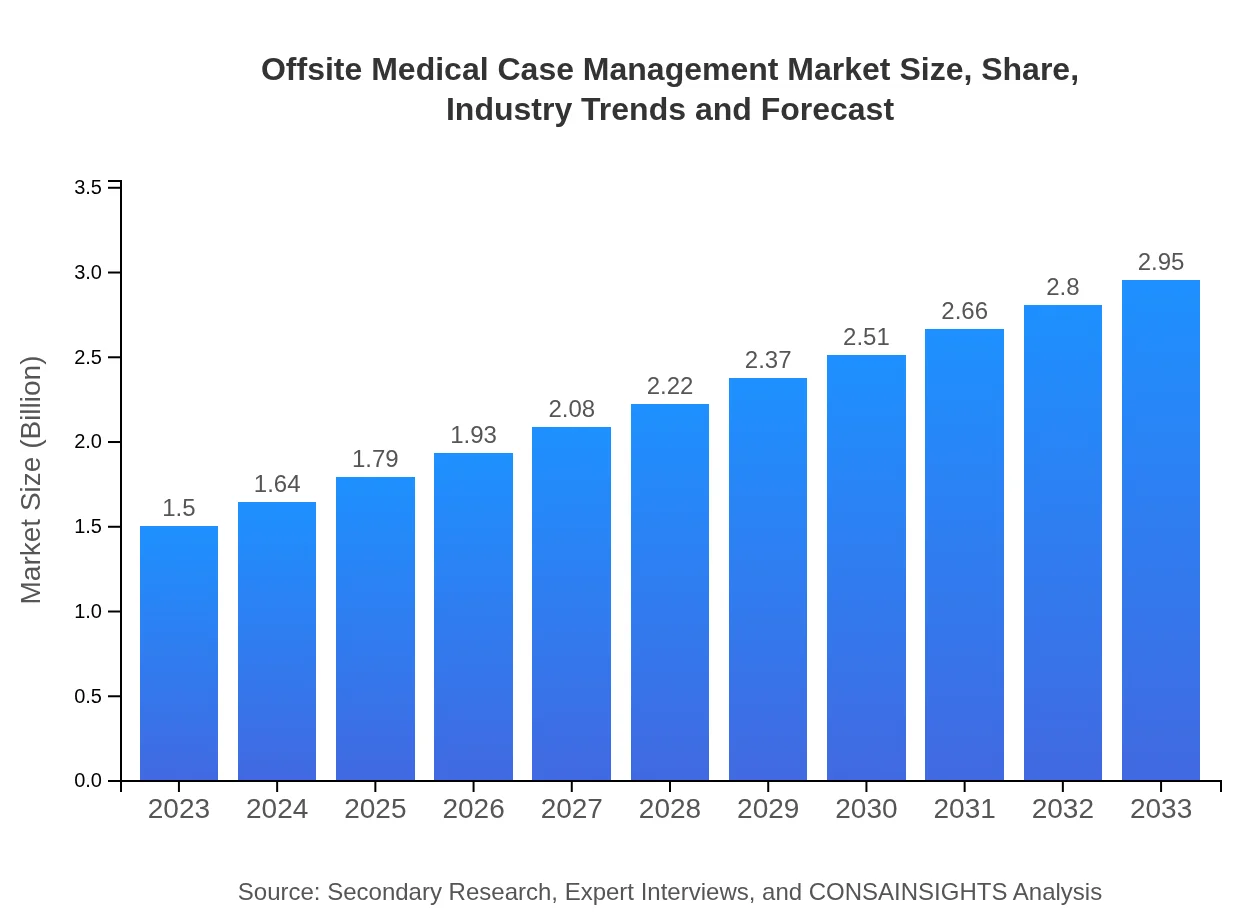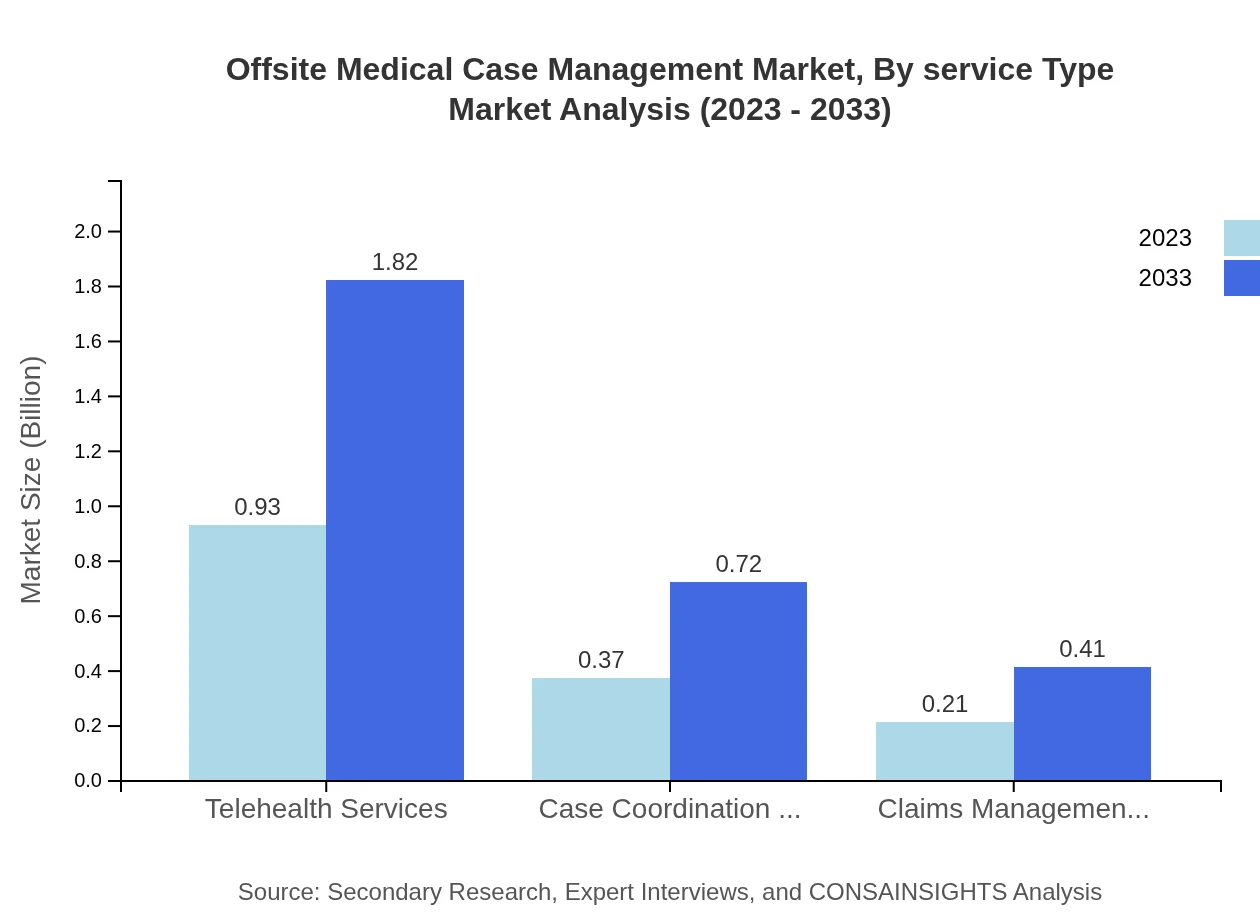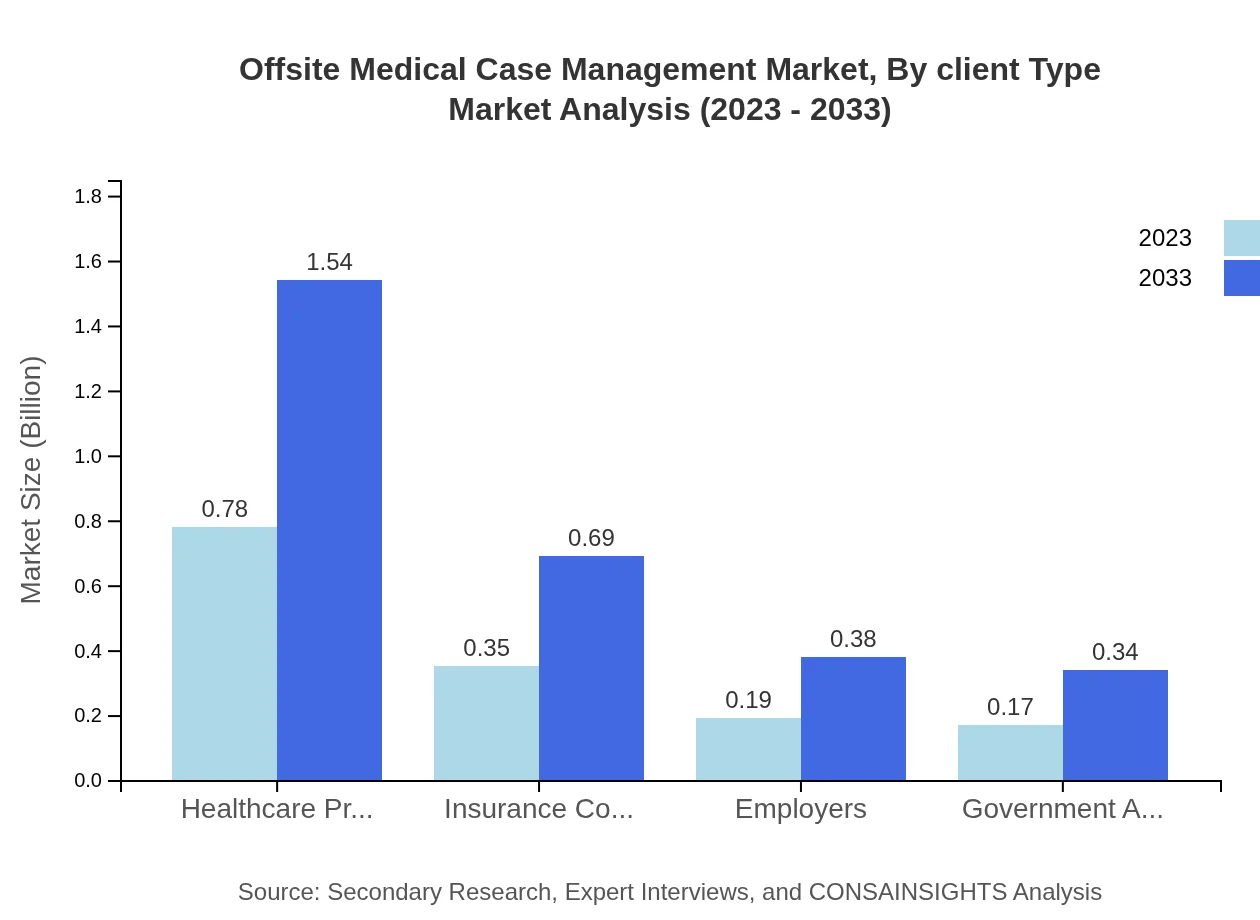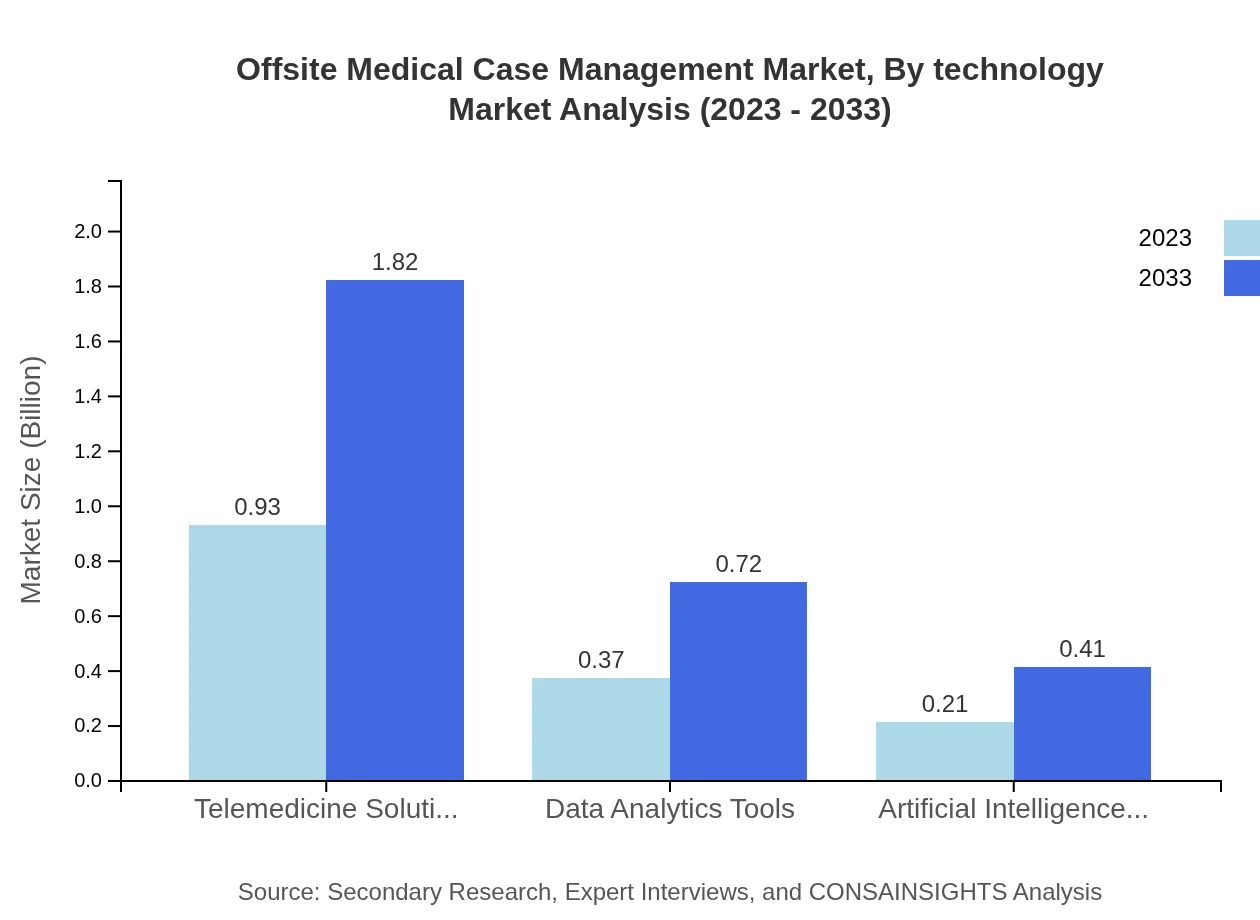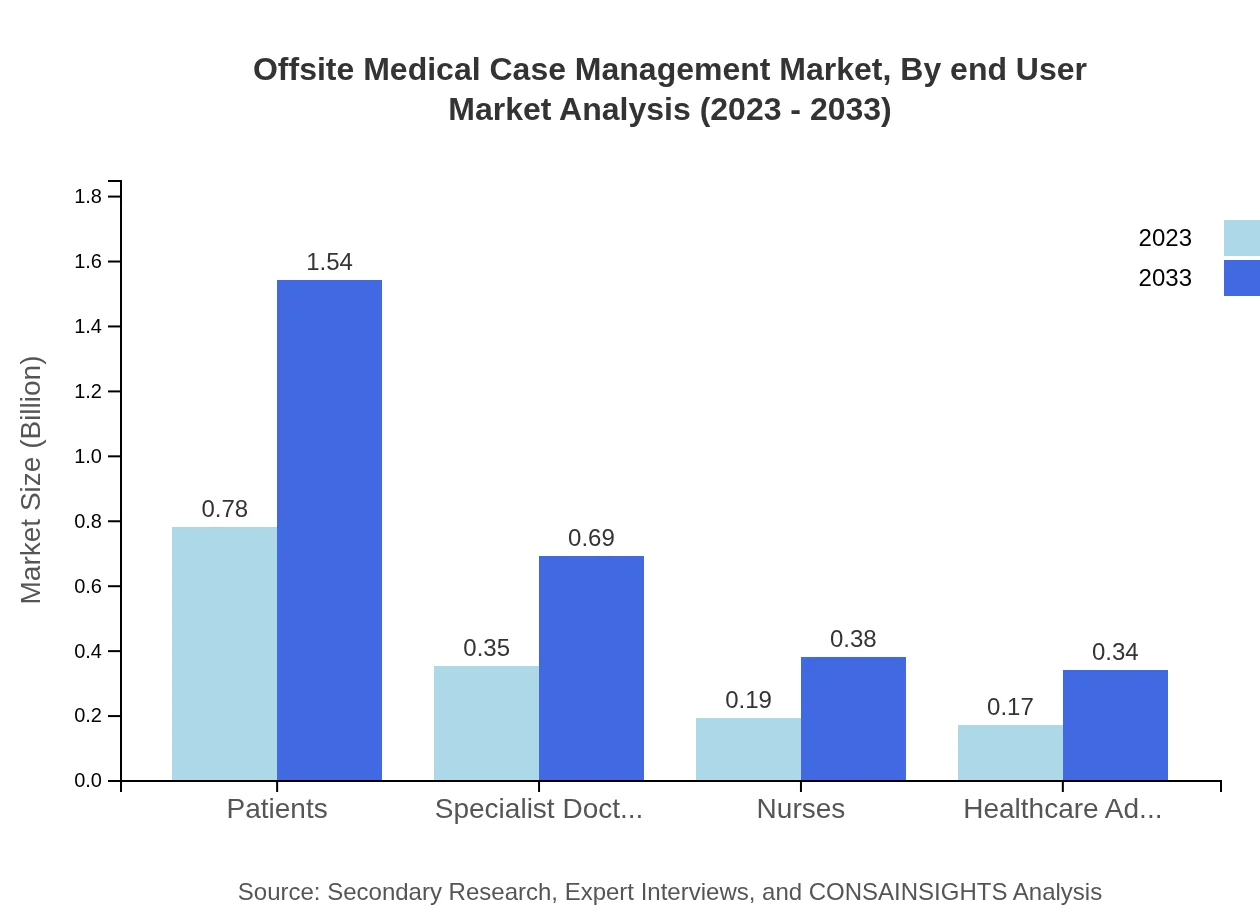Offsite Medical Case Management Market Report
Published Date: 31 January 2026 | Report Code: offsite-medical-case-management
Offsite Medical Case Management Market Size, Share, Industry Trends and Forecast to 2033
This report delivers comprehensive insights into the Offsite Medical Case Management market, analyzing its size, growth potential, trends and technology impacts from 2023 to 2033. A detailed industry analysis and segmentation assessments are provided to motivate strategic decision-making.
| Metric | Value |
|---|---|
| Study Period | 2023 - 2033 |
| 2023 Market Size | $1.50 Billion |
| CAGR (2023-2033) | 6.8% |
| 2033 Market Size | $2.95 Billion |
| Top Companies | Health Management Associates, Optum Health, Cigna, Mayo Clinic |
| Last Modified Date | 31 January 2026 |
Offsite Medical Case Management Market Overview
Customize Offsite Medical Case Management Market Report market research report
- ✔ Get in-depth analysis of Offsite Medical Case Management market size, growth, and forecasts.
- ✔ Understand Offsite Medical Case Management's regional dynamics and industry-specific trends.
- ✔ Identify potential applications, end-user demand, and growth segments in Offsite Medical Case Management
What is the Market Size & CAGR of Offsite Medical Case Management market in 2023?
Offsite Medical Case Management Industry Analysis
Offsite Medical Case Management Market Segmentation and Scope
Tell us your focus area and get a customized research report.
Offsite Medical Case Management Market Analysis Report by Region
Europe Offsite Medical Case Management Market Report:
The European Offsite Medical Case Management market is projected to increase from $0.47 billion in 2023 to $0.92 billion by 2033. Factors such as an aging population and supportive healthcare policies emphasizing efficiency in care delivery are key drivers.Asia Pacific Offsite Medical Case Management Market Report:
The Offsite Medical Case Management market in Asia Pacific is projected to grow significantly, reaching $0.55 billion by 2033 from $0.28 billion in 2023. The increasing adoption of telemedicine and awareness of chronic disease management drives this growth, alongside rapid urbanization in the region.North America Offsite Medical Case Management Market Report:
North America remains a dominant region in the Offsite Medical Case Management market, anticipated to grow from $0.53 billion in 2023 to $1.04 billion by 2033. This robust growth is driven by a well-established healthcare system, increasing prevalence of chronic diseases, and technological advancements in telehealth.South America Offsite Medical Case Management Market Report:
In South America, the market is expected to expand from $0.11 billion in 2023 to $0.22 billion by 2033. Growing healthcare infrastructure and rising investments in healthcare services contribute to this positive outlook, along with demand for improved healthcare access.Middle East & Africa Offsite Medical Case Management Market Report:
The market in the Middle East and Africa is forecasted to grow from $0.11 billion in 2023 to $0.21 billion by 2033. An emerging focus on improving healthcare services and infrastructure advancements are critical for driving offsite medical case management adoption.Tell us your focus area and get a customized research report.
Offsite Medical Case Management Market Analysis By Service Type
In the Offsite Medical Case Management market, service types such as telehealth solutions have shown substantial growth, contributing to $0.93 billion in 2023 and expected to reach $1.82 billion in 2033. This segment accounted for a significant market share of 61.76%, enhancing access and engagement for patients. Data analytics tools and case coordination services are also essential segments, facilitating informed decision-making and care planning.
Offsite Medical Case Management Market Analysis By Client Type
Client types in this market include healthcare providers, insurers, and employers. Healthcare providers hold a 52.28% share in size, poised to grow from $0.78 billion in 2023 to $1.54 billion by 2033. Insurers and employers also play significant roles, ensuring the sustainability of offsite management programs, with the insurers segment representing a share of 23.32% in 2023.
Offsite Medical Case Management Market Analysis By Technology
Technological advancements significantly influence Offsite Medical Case Management. The incorporation of artificial intelligence, which accounts for a 13.83% market share, is set to enhance case management efficiency. Telemedicine technologies have become fundamental, comprising 61.76% of the market share, as their increased usage leads to better patient monitoring and engagement.
Offsite Medical Case Management Market Analysis By End User
End-users of Offsite Medical Case Management include patients, healthcare providers, insurers, and government agencies. Patients dominate this segment, with an anticipated growth from $0.78 billion in 2023 to $1.54 billion by 2033. This shift is propelled by the need for personalized care and remote monitoring systems to improve health outcomes and patient satisfaction.
Offsite Medical Case Management Market Trends and Future Forecast
Tell us your focus area and get a customized research report.
Global Market Leaders and Top Companies in Offsite Medical Case Management Industry
Health Management Associates:
A leader in providing managed healthcare solutions, specializing in integrating telehealth and care coordination services to enhance patient outcomes.Optum Health:
Optum Health is renowned for utilizing advanced analytics and technology to deliver superior offsite medical case management solutions.Cigna:
Cigna focuses on value-based care through offsite case management, utilizing a patient-first approach to improve healthcare access and efficiency.Mayo Clinic:
Mayo Clinic is recognized for its commitment to innovative health solutions, including offsite care initiatives that streamline patient management.We're grateful to work with incredible clients.









FAQs
What is the market size of offsite Medical Case Management?
The offsite medical case management market is projected to grow from $1.5 billion in 2023 to significantly larger by 2033, with a compound annual growth rate (CAGR) of 6.8%. This indicates substantial growth potential within the industry.
What are the key market players or companies in this offsite Medical Case Management industry?
Key players in the offsite medical case management industry include prominent healthcare organizations, insurance companies, and technology providers specializing in telehealth and analytics tools, which are pivotal to enhancing service delivery and management.
What are the primary factors driving the growth in the offsite Medical Case Management industry?
Growth in this industry is driven by increased demand for remote patient monitoring, advancements in telehealth technology, rising chronic disease prevalence, and the need for cost-effective healthcare solutions that improve patient outcomes.
Which region is the fastest Growing in the offsite Medical Case Management?
The North American region is expected to experience the fastest growth in offsite medical case management, moving from a market size of $0.53 billion in 2023 to $1.04 billion by 2033, reflecting robust investment in healthcare technologies.
Does ConsaInsights provide customized market report data for the offsite Medical Case Management industry?
Yes, ConsaInsights specializes in providing customized market report data, including tailored insights for businesses in offsite medical case management, facilitating informed decision-making and strategic planning.
What deliverables can I expect from this offsite Medical Case Management market research project?
Expect comprehensive reports including market size analyses, growth forecasts, competitive landscape, regional insights, and segmentation data, with actionable recommendations based on the latest industry trends.
What are the market trends of offsite Medical Case Management?
Trends include an increasing shift towards telemedicine solutions, enhanced use of data analytics in patient management, and the incorporation of artificial intelligence to improve efficiency in case management processes.

